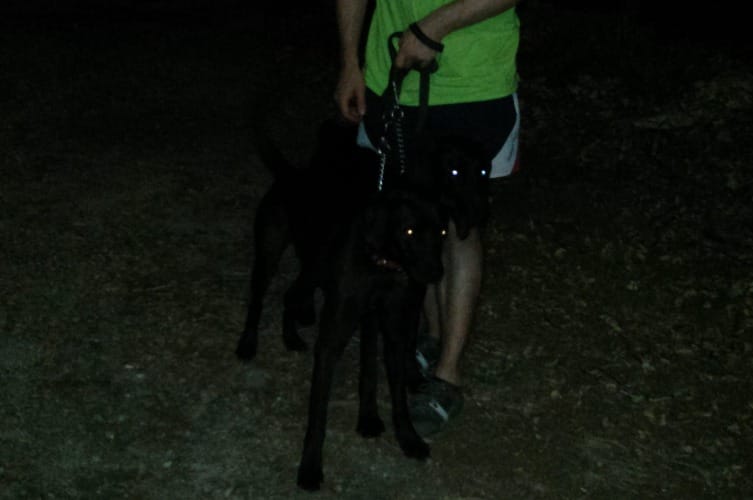Many dog owners have experienced the frustration of a dog that won't stop barking at night. Whether it's due to anxiety, boredom, or a desire for attention, excessive barking can disrupt both the dog's and owner's sleep. In this article, we will explore some of the reasons why dogs bark at night and provide tips on how to address this behavior.

One common reason for nighttime barking is separation anxiety. Dogs who experience anxiety when left alone may bark excessively as a way to cope with their fear and loneliness. Other dogs may bark out of boredom or frustration, especially if they are not getting enough exercise or mental stimulation during the day. In some cases, a dog may simply be seeking attention from their owner, and barking is their way of getting it. Understanding the root cause of your dog's barking can help you develop a plan to address it.
Understanding the Causes of Nighttime Barking
Identify Why Your Dog Is Barking
When a dog barks excessively at night, it is important to identify the underlying cause. One of the best ways to do this is to observe the dog's behavior and environment. Is the dog barking at a particular time of night or in response to a specific stimulus? Is the dog barking at something outside or inside the house? Answering these questions can help identify the cause of the barking.
Common Reasons for Barking at Night
There are several common reasons why dogs bark at night. One of the most common reasons is that they are alerting their owners to potential danger or intruders. Dogs may also bark due to separation anxiety, discomfort, or fear. In some cases, dogs may simply be bored and seeking attention.
Behavioral Issues and Anxiety
Behavioral issues and anxiety can also contribute to nighttime barking. Dogs that are anxious or stressed may bark excessively, especially if they are left alone for long periods of time. Separation anxiety, in particular, can cause dogs to bark, whine, and howl when their owners are not around.
Environmental Factors
Environmental factors can also play a role in nighttime barking. Dogs that are exposed to loud noises, such as fireworks or thunderstorms, may bark in response. Similarly, dogs that are uncomfortable due to extreme temperatures or lack of space may bark as a way to communicate their distress.
Overall, it is important to identify the underlying cause of nighttime barking in order to address the issue effectively. By understanding the reasons for barking, dog owners can take steps to alleviate stress, anxiety, and discomfort, and provide their pets with a more comfortable and peaceful environment.
Effective Training Techniques

Establishing a Routine
One of the most important aspects of training a dog to stop barking at night is to establish a routine. Dogs are creatures of habit, and they thrive on consistency. By creating a routine for your dog, you can help them understand when it's time to be quiet and settle down for the night.
Positive Reinforcement
Positive reinforcement is a powerful training technique that can be used to train dogs to stop barking at night. This technique involves rewarding your dog for good behavior, such as being quiet when asked. Treats, toys, and verbal praise can all be used as positive reinforcement.
Command Training
Command training is another effective technique for training a dog to stop barking at night. This technique involves teaching your dog specific commands, such as "sit" and "speak." By teaching your dog these commands, you can give them a way to communicate with you without barking excessively.
Alternative Behaviors
Sometimes, dogs bark at night because they are bored or restless. To combat this, it's important to provide your dog with alternative behaviors to engage in. This can include providing your dog with toys to play with, or taking them for a walk before bedtime to tire them out.
By using these training techniques consistently and positively, owners can help their dogs learn to stop barking at night. It's important to remember that training takes time and patience, and that consistent effort is necessary to achieve the desired results.

Creating a Comfortable Environment
Creating a comfortable environment for your dog is crucial when trying to stop excessive barking at night. Here are some tips to help your furry friend feel more at ease:
Crate Training and Comfort Zones
Crate training can be a helpful tool in creating a safe and comfortable space for your dog. Make sure the crate is the appropriate size for your dog, and add comfortable bedding inside. Place the crate in a quiet, dark corner of the room, away from any external stimuli that may be causing your dog to bark.
It's also important to create other comfort zones around your home. This can be a designated dog bed or a cozy corner with blankets and toys. Having a comfortable space to retreat to can help your dog feel more secure and relaxed.
Reducing External Stimuli
External stimuli, such as noises and lights, can be a major cause of nighttime barking. Consider using blackout curtains to block out any light that may be coming into the room. This will create a more peaceful and calming environment for your dog.
If your dog is sensitive to noise, consider using calming products such as pheromone sprays or diffusers. These products can help create a calming atmosphere and reduce anxiety in your dog.
Using White Noise for Calm
White noise can be a helpful tool in creating a calming environment for your dog. This can be in the form of a white noise machine or a fan. The constant background noise can help drown out any external sounds that may be causing your dog to bark.
In conclusion, creating a comfortable environment for your dog is essential in reducing excessive barking at night. By using crate training, reducing external stimuli, and incorporating white noise, you can help your furry friend feel more relaxed and at ease.

Exercise and Mental Stimulation
Dogs who bark excessively at night may be experiencing boredom or excess energy. Providing physical exercise and mental stimulation can help alleviate these issues and reduce nighttime barking.
The Importance of Physical Exercise
Physical exercise is essential for a dog's overall health and well-being. It not only helps maintain a healthy weight but also provides an outlet for excess energy. Taking a dog for a walk or run during the day can tire them out and reduce the likelihood of nighttime barking.
In addition to walks, playing fetch or engaging in other games can also provide physical exercise. Owners should aim to provide at least 30 minutes of moderate to vigorous exercise per day, but this can vary depending on the dog's breed, age, and health status.
Enrichment Activities and Toys
In addition to physical exercise, mental stimulation is crucial for a dog's mental health. Enrichment activities and toys can provide mental stimulation and prevent boredom, which can lead to nighttime barking.
Interactive toys, such as puzzle feeders and treat-dispensing toys, can keep a dog's mind occupied and provide a fun challenge. Owners can also hide treats around the house or play scent games to engage a dog's sense of smell.
Training sessions can also provide mental stimulation and strengthen the bond between owner and dog. Learning new commands and tricks can keep a dog's mind engaged and provide a sense of accomplishment.
Overall, providing physical exercise and mental stimulation can help reduce excessive barking at night. Owners should aim to provide a variety of activities to keep their dog's mind and body healthy and happy.

Health and Nutrition
Diet and Treats
A dog's diet can greatly affect their behavior, including excessive barking at night. It is important to ensure that the dog is receiving a balanced diet that meets their nutritional needs. Feeding the dog appropriate amounts of high-quality protein, carbohydrates, and fats can help regulate their energy levels and reduce the likelihood of barking due to hunger or discomfort.
Additionally, treats should be given in moderation and only as a reward for good behavior. Overfeeding the dog with treats can lead to weight gain and other health issues that may contribute to barking at night. It is recommended to choose treats that are low in calories and made with natural ingredients.
Recognizing Pain and Illness
Barking at night may also be a sign of pain or illness. It is important to take the dog to a veterinarian for regular check-ups and to address any health concerns promptly. Dogs may not always display obvious signs of pain or illness, so it is important to pay attention to any changes in behavior, appetite, or energy levels.
If the dog's excessive barking at night is accompanied by other symptoms such as lethargy, vomiting, or diarrhea, it may be a sign of a more serious underlying health issue. In such cases, it is important to seek veterinary care immediately.
In conclusion, maintaining a balanced diet and monitoring the dog's health are important factors in reducing excessive barking at night. By taking a proactive approach to the dog's nutrition and health, owners can help ensure a peaceful and restful night's sleep for both the dog and themselves.

Professional Assistance and Tools
When to Consult a Dog Trainer
If a dog won't stop barking at night, it may be time to consider consulting a professional dog trainer. A dog trainer can help identify the root cause of the barking behavior and develop a training plan to address it. They can also provide guidance on how to properly use tools such as calming collars and treats.
Calming Collars and Treats
Calming collars and treats can be helpful tools in reducing a dog's nighttime barking. Calming collars work by releasing pheromones that mimic the natural calming scents dogs produce. Calming treats contain natural ingredients such as chamomile and valerian root that can help soothe a dog's nerves.
It is important to note that while these tools can be effective, they should not be relied upon as a sole solution. It is important to address the underlying cause of the barking behavior through training and behavior modification.
The Role of a Veterinarian
In some cases, excessive barking at night can be a symptom of an underlying medical condition. It is important to consult with a veterinarian to rule out any potential health issues that may be contributing to the barking behavior.
A veterinarian can also recommend medication or other treatments to help manage the behavior if necessary. It is important to work closely with a veterinarian and follow their recommendations to ensure the safety and well-being of the dog.
Managing Relations with Neighbors
When a dog barks excessively at night, it can be a nuisance for neighbors. It is important to manage relations with neighbors in order to maintain a peaceful and amicable community. Here are a few tips to help manage relations with neighbors:
- Communicate: Talk to your neighbors and explain the situation. Let them know that you are aware of the problem and are working on a solution. Offer to keep them updated on your progress and ask for their patience and understanding.
- Address the problem: Identify the cause of the barking and take steps to address it. If the dog is barking due to boredom or lack of attention, provide more exercise and mental stimulation during the day. If the barking is due to fear or anxiety, consult with a veterinarian or animal behaviorist for guidance on how to manage the dog's behavior.
- Reduce frequency: If the barking is occurring frequently throughout the night, consider keeping the dog indoors or in a separate room at night. This can help reduce the frequency of the barking and minimize disturbance to neighbors.
- Motivation: Determine what is motivating the dog to bark and address it. If the dog is barking at passersby, consider blocking the dog's view or providing a distraction, such as a toy or treat, to redirect their attention.
By following these tips, you can manage relations with neighbors and work towards a peaceful and harmonious community. Remember, communication and addressing the problem are key to resolving any issues that may arise.

Long-Term Strategies and Patience
Dealing with a dog that won't stop barking at night can be a frustrating experience for any pet owner. However, it's important to remember that patience is key when trying to address this issue. There are several long-term strategies that can be employed to help reduce excessive barking in dogs.
One approach is to focus on positive reinforcement training. This involves rewarding your dog when they exhibit good behavior, such as being quiet during the night. Over time, your dog will learn that quiet behavior is rewarded and will be more likely to exhibit it in the future.
Another key factor is communication. It's important to establish clear communication with your dog and let them know what you expect from them. This can involve setting boundaries and rules for behavior, such as not barking excessively at night.
A long-term approach also involves being patient with your dog. It can take time for them to learn new behaviors and habits, and it's important to remain consistent in your training efforts. This means being patient and persistent in your training, even if you don't see immediate results.
Overall, a positive and patient approach is key when dealing with a dog that won't stop barking at night. By focusing on long-term strategies and consistent training efforts, pet owners can help reduce excessive barking and improve their dog's behavior.
Understanding Aging and Nighttime Barking
As dogs age, their behavior and needs change. One common issue that many pet owners face is nighttime barking. Understanding the reasons behind this behavior can help owners take appropriate steps to address the problem.
Senior Dogs and Dementia
As dogs age, they may experience cognitive decline, including dementia. This can cause confusion, disorientation, and anxiety, which can lead to nighttime barking. Dogs with dementia may also forget their training and revert to behaviors such as barking that they had previously outgrown.
Coping with Aging Related Barking
There are several strategies that pet owners can use to help their aging dogs cope with nighttime barking. These include:
- Providing a comfortable sleeping environment: Older dogs may have difficulty getting comfortable, which can lead to restlessness and barking. Providing a comfortable bed and blankets can help them sleep more soundly.
- Increasing exercise: Regular exercise can help reduce anxiety and restlessness in dogs. Owners should consult with their veterinarian to determine an appropriate exercise regimen for their aging dog.
- Using calming aids: There are several products available that can help calm anxious dogs, including pheromone sprays and calming collars. Owners should consult with their veterinarian before using any calming aids.
- Addressing underlying health issues: Some health issues, such as pain or discomfort, can cause nighttime restlessness and barking. Owners should consult with their veterinarian to rule out any underlying health issues.
In conclusion, nighttime barking in aging dogs can be caused by a variety of factors, including dementia, anxiety, and discomfort. Owners can use a combination of strategies to help their dogs cope with nighttime barking and get a good night's sleep.

Addressing Separation Anxiety and Fear
Separation anxiety and fear are two common reasons why dogs bark excessively at night. Separation anxiety occurs when a dog becomes anxious or stressed when separated from their owner or family. Fear, on the other hand, can be caused by a variety of factors such as loud noises, unfamiliar surroundings, or traumatic experiences.
To address separation anxiety, it is important to gradually introduce the dog to being alone. This can be done by leaving the dog alone for short periods of time and gradually increasing the time as the dog becomes more comfortable. Providing the dog with a safe and comfortable space, such as a crate or a specific room, can also help alleviate separation anxiety.
For dogs that are fearful, identifying the trigger and addressing it can help reduce barking at night. For example, if a dog is afraid of loud noises, providing a safe and quiet space for the dog during loud events such as thunderstorms can help reduce anxiety. Gradual exposure to the trigger in a controlled and positive environment can also help desensitize the dog to the fear.
It is important to note that addressing separation anxiety and fear may require professional help from a veterinarian or a certified dog behaviorist. In some cases, medication may also be necessary to help manage anxiety. It is important to approach these issues with patience, consistency, and a positive attitude to help the dog overcome their anxiety and fear.
Dealing with Specific Barking Issues

Reducing Nighttime Barking Frequency
If your dog won't stop barking at night, it can be frustrating for both you and your neighbors. One way to reduce nighttime barking frequency is to make sure your dog gets enough exercise during the day. A tired dog is more likely to sleep through the night without barking.
Another way to reduce nighttime barking is to create a calming environment for your dog. This can include playing calming music, using a white noise machine, or providing a comfortable bed in a quiet room. If your dog is anxious, consider using an anxiety wrap or pheromone spray to help them feel more relaxed.
It's also important to establish a consistent bedtime routine for your dog. This can include a bedtime snack, a walk outside, and some quiet time before bed. By establishing a routine, your dog will learn that it's time to sleep and not time to bark.
Handling Demand Barking
Demand barking is when a dog barks to get something they want, such as food, attention, or a toy. To handle demand barking, it's important to not give in to your dog's demands. If your dog barks for food, wait until they are quiet before giving them their meal. If your dog barks for attention, wait until they are calm before giving them pets or playtime.
It's also important to teach your dog an alternative behavior to demand barking. This can include teaching them to sit or lay down before receiving their food or attention. By teaching your dog an alternative behavior, you can redirect their energy and reduce their demand barking.
Finally, it's important to not reinforce demand barking by giving in to your dog's demands. If your dog barks for attention and you give them attention, they will learn that barking is an effective way to get what they want. Instead, wait until your dog is calm and then give them attention or rewards.
Avoiding Common Mistakes

Ineffective Punishment Methods
When dealing with a dog that won't stop barking at night, it is important to avoid using punishment methods that are ineffective. Punishing a dog for barking may seem like the natural response, but it can actually make the problem worse. Punishing a dog can cause fear and anxiety, which can lead to even more barking.
One common punishment method is spraying the dog with water. While this may startle the dog and stop the barking temporarily, it is not a long-term solution. The dog may become accustomed to the water and continue barking despite being sprayed.
Another ineffective punishment method is using shock collars. Shock collars can cause physical pain and emotional distress to the dog, which can lead to more barking and other behavioral issues.
The Problem with Yelling at Your Dog
Yelling at a dog that won't stop barking may seem like a logical response, but it can actually make the problem worse. Dogs do not understand yelling as a form of communication and may become confused or frightened.
Yelling can also cause the dog to become more anxious, which can lead to more barking. In addition, yelling can damage the relationship between the dog and the owner, leading to trust issues and further behavioral problems.
Instead of yelling, it is important to remain calm and use positive reinforcement techniques to train the dog to stop barking at night. By rewarding good behavior and ignoring bad behavior, the dog will learn that barking is not an effective way to get attention or treats. This will lead to a happier and more peaceful home for both the dog and the owner.
Frequently Asked Questions
- What can I do to stop my dog from barking in his crate during the night?
- There are several things you can do to help your dog stop barking in his crate at night. First, make sure your dog is comfortable in his crate by providing him with a comfortable bed and enough space to move around. You can also try leaving a light on or playing calming music to help your dog relax. Additionally, make sure your dog gets plenty of exercise during the day and has plenty of mental stimulation to keep him from getting bored.
- How might I effectively calm my dog when he barks at night?
- To effectively calm your dog when he barks at night, you can try using calming techniques such as deep breathing exercises or massage. You can also try distracting your dog with toys or treats, or using a calming spray or diffuser. It's important to remain calm and patient with your dog, as getting angry or frustrated can make the situation worse.
- What are the reasons for a dog suddenly starting to bark at night?
- There are several reasons why a dog may suddenly start barking at night, including anxiety, boredom, hunger, or a medical issue. It's important to rule out any medical issues by taking your dog to the vet, and to address any underlying anxiety or boredom by providing your dog with plenty of mental and physical stimulation.
- What should I do if my old dog persistently barks at night?
- If your old dog persistently barks at night, it's important to first rule out any medical issues by taking your dog to the vet. If there are no medical issues, you can try providing your dog with a comfortable bed, leaving a light on, and playing calming music to help him relax. You can also try using calming techniques such as deep breathing exercises or massage.
- Is using a muzzle a humane way to prevent a dog from barking at night?
- Using a muzzle to prevent a dog from barking at night is not recommended, as it can be uncomfortable and stressful for the dog. Additionally, it does not address the underlying issue causing the barking, such as anxiety or boredom. It's important to address the underlying issue and provide your dog with plenty of mental and physical stimulation.
- How can I address a neighbor's dog that barks incessantly at night?
- If your neighbor's dog is barking incessantly at night, it's important to first talk to your neighbor and try to come up with a solution together. If talking to your neighbor does not work, you can contact your local animal control or law enforcement agency for assistance. It's important to remember to remain calm and respectful when addressing the situation.




